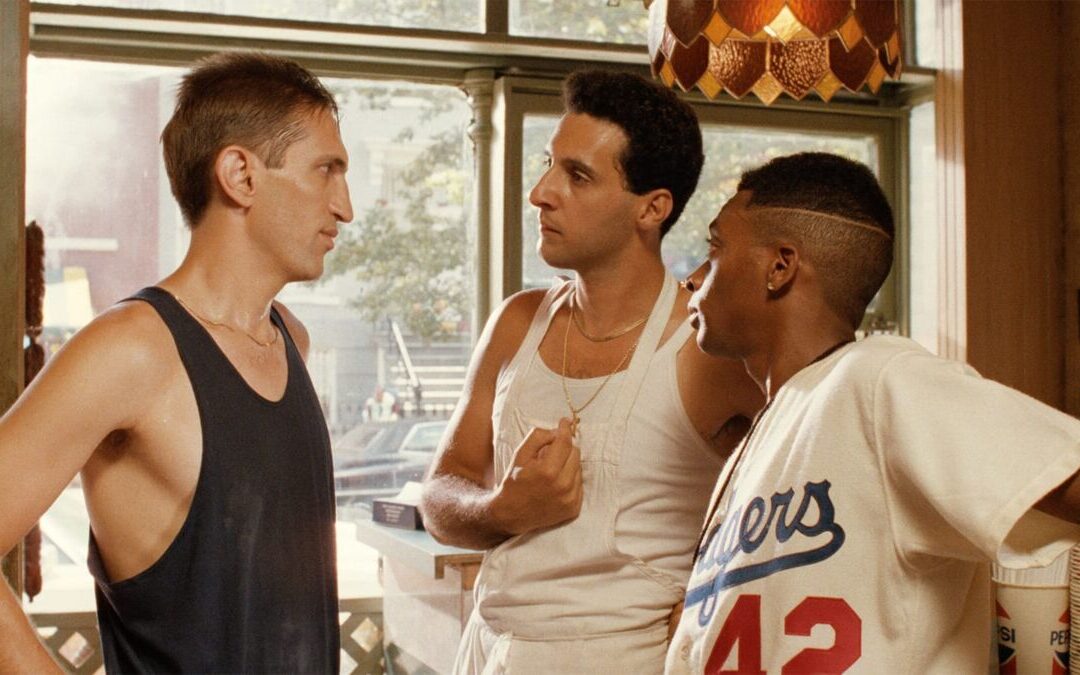Being four years old when Spike Lee’s Do the Right Thing stormed previews and its eventual wider release with electric controversy, I missed out on the discourse. I wish I could have been old enough to see the movie for itself in its time. There’s a little context in my memories that allows Lee’s rapid-paced ensemble drama, with stunning comedic flare-ups of wit and devastatingly funny commentary, to make sense, but obviously not very much.
As it is, I appreciate Do the Right Thing mostly as a masterpiece of filmmaking, storytelling, acting, editing, music, sound design, production design, and literally every other facet of the cinematic process. It’s also relatively easy to take some of the plot points and racial tensions between a black neighborhood and a local Italian-owned pizza place and find relevancy in the present for everything Do the Right Thing covers.
But reading about when the movie came out makes me think about the fact that at one point, not too terribly long ago, people talked about movies. They talked about a lot of different sorts of movies. Do the Right Thing answers many of the questions it asks about race and racism, while leaving a few of its own on the table in a stunning, singular style. It seems as though those questions and answers generated so much discourse, Roger Ebert remarked on it in his famous 1989 review of the film, writing that Do the Right Thing “comes closer to reflecting the current state of race relations in America than any other movie of our time.” No other white critic seemed to appreciate that better than Ebert.
It’s hard as a film nerd to not be nostalgic for a time when people could watch Do the Right Thing on the same weekend they could see The Karate Kid III or the unhinged Jerry Lee Lewis biopic Great Balls of Fire! Say what you want about either of those films, but that’s just a sampling of a summer 1989 movie season that retroactively seems almost supernatural. Do the Right Thing means something to me for this reason alone. It’s a blaring and joyous and tension-laden classic that at the same time is a faint reminder of what mainstream movies were like 30+ years ago. There was garbage then, too, and people who thought the landscape of cinema was in the worst shape of its young life, but I’m allowed to argue with the benefit of hindsight that all of that is much worse now.
Would a studio give a young Black filmmaker $6 million ($14 million when adjusted for inflation) to make a wide-release movie like Do the Right Thing in 2023? Maybe. It’s hard to be optimistic about these things. Do the Right Thing is oddly a product in my own mind of a long-gone past and the constant, tumultuous present.
I’m not going to relate directly to Do the Right Thing because I’m not Black (or Italian, for that matter), but it’s not hard to empathize with the seen and unseen elements and social forces pushing a neighborhood of young and old, bold and quietly embittered, eccentric and just plain sadistic to its boiling point on one of the hottest days of the year. Do the Right Thing, if you haven’t seen it yet, is one of the most compulsory character study experiences you could ever have. You get wrapped up in these characters immediately, following them along on a journey by a filmmaker and crew who made one of the best films of the 80s.
I can’t recommend it enough, unless you’re worried that some of the questions raised by Do the Right Thing are going to make you too uncomfortable. Among others, the movie asks us if Spike Lee’s character Mookie do the right thing when he hurled a trash can through the window of his boss’ (a memorable and powerful Danny Aiello) pizza place. That’s the eternal question that hung over Do the Right Thing in 1989 and continues to drive some of its appeal in the present. It’s an interesting question, although I don’t think it’s a hard one to answer. Of course he did.
READ NEXT: Vertigo (1958) | Movies To See Before You Die
Some of the coverage you find on Cultured Vultures contains affiliate links, which provide us with small commissions based on purchases made from visiting our site.

![Do the Right Thing - 4K Ultra HD + Blu-ray + Digital [4K UHD]](https://m.media-amazon.com/images/I/51yR15L1hYL._SL75_.jpg)
